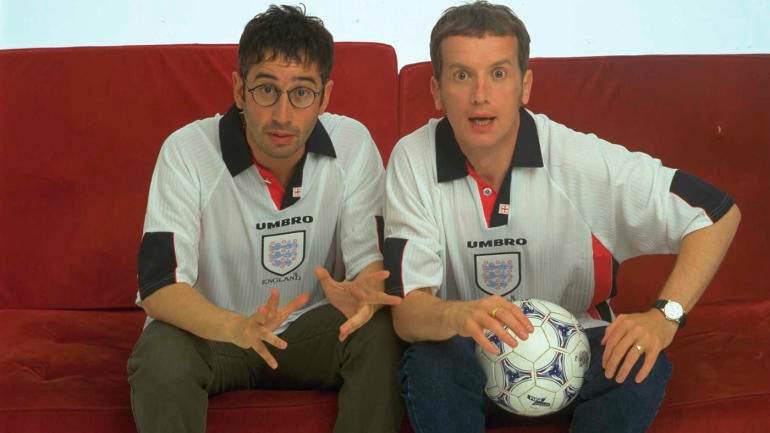
For the first time since 1966, England have reached the final of a major soccer tournament and one thing that's abundantly clear is they certainly want the world to know about it. If you haven't seen or heard the phrase "It's Coming Home" yet, you probably will before Sunday's UEFA Euro 2020 final against Italy. But what does it mean? And should you be annoyed about it? A real English person answers your questions below:
Why everyone keeps saying 'It's Coming Home'
Because a socially incapacitated nation is incapable of having sincere conversations about how they're feeling right now? That'll be it for the most part, but to delve into the specifics, 'It's coming home' is the refrain of one of the most beloved football songs of the English game: "Three Lions (Football's Coming Home)" by David Baddiel, Frank Skinner and the Lightning Seeds. First released for Euro 1996 in England and subsequently honed -- some might say improved but you're opening a whole can of worms there -- for the World Cup two years later, it reached No. 1 in the British charts in both its iterations.
The song has been a terrace standard since the 1990s, but reached greater heights of popularity in England's surprise run to the 2018 FIFA World Cup semifinal, becoming a de facto anthem for the national team. Indeed the line "football's coming home" has begun bleeding out of Three Lions and into other songs, most notably an interpolation of "Whole Again" by girl group Atomic Kitten. Once a schmaltzy pop song, it has now become an ode to the England manager with the chorus "Southgate you're the one/You still turn me on/Football's coming home again".
In other words, yes, things have gone off the deep end in this sceptered isle.
What do they mean by football's coming home?
In simple terms, that a major tournament is being played in England. Soccer may not have been invented there, but it was codified and exported to much of the world in the 19th century. Three Lions was commissioned by the English Football Association, who for most of their history have referred to themselves as The FA in an act of English exceptionalism that invariably plays poorly with the rest of the world, to celebrate the country hosting Euro 96, the first major tournament in Britain for 30 years. A key strap line to the tournament was "Football Comes Home." Ian Broudie, songwriter of the Lightning Seeds, composed a melody at the request of the FA, and with the aid of comedians Baddiel and Skinner, a totemic pop song was born.
The same could be said to be true of 2021, when Wembley Stadium is hosting the semifinals and final of the continent-spanning European Championships. However, that was not true of the 2018 World Cup in Russia. On that occasion the message, emphatically tongue in cheek though it may have been, appeared to be that football's coming home with us because England are going to win the World Cup.
Craving even more coverage of Euro 2020? Listen below and follow ¡Qué Golazo! A Daily CBS Soccer Podcast where we take you beyond the pitch and around the globe for commentary, previews, recaps and more.
What do other teams think about the song?
Not a lot. Not a lot at all. The first team to viscerally react to the chant in notable fashion were Croatia, England's fellow semifinalists at the World Cup three years ago. After beating them 2-1 in Moscow, center back Vedran Corluka is said to have told English media "it's not coming home." Luka Modric suggested that the nation's media had lacked humility, seemingly citing that unofficial anthem as a contributing factor, while manager Zlatko Dalic has hinted that Three Lions was fuel to the Croatian fire.
Three years later, when Denmark goalkeeper Kasper Schmeichel was asked for his thoughts on the chant, his response was altogether more dismissive. "Has it ever been home? I don't know, have you ever won [the Euros]?" What followed was a brief but relatively fiery debate between player and journalist that focused on whether it was glory at a major tournament (which England have enjoyed once before) or at the European Championships (which they have not).
All of England at full-time 🏴 🗣️ pic.twitter.com/BEJGK0Br1W
— CBS Sports Golazo (@CBSSportsGolazo) July 7, 2021
It is perhaps fair to question to what extent footballers truly see this as arrogance or whether it is the Michael Jordan "And I took that personally" meme writ large. Did the Croatian players sincerely believe that the chant emanating from supporters in Russia and England in any way reflected the attitude of Southgate's squad? Or did it offer that further fire to the flame if they convinced themselves it did?
Are they right to be so upset?
Well, if you only listen to the chorus of "Born in the USA" you might think it is a rabble rousing cry of patriotism. If you aren't really paying attention to "The One I Love or Every Breath You Take" you might think "this could be a great song for the first dance at my wedding." If enough people join you in that conclusion, then perhaps the meaning of the song can transmogrify. Equally, you've still come away from the piece with a meaning utterly at odds to that which its author intended.
Ask those associated with the song -- or indeed just examine the lyrics -- and it will become apparent that Three Lions is no battle cry for English superiority but an ode to hope in the face of crushing reality. This is about the knowledge "That England's gonna throw it away/gonna blow it away," but the desire to think that this time it might be different, like it was in 1966.
As Broudie explained to the Guardian last month: "In my mind, the line: 'It's coming home' ... is more about being a football fan, which for 90% of the time, is losing." Baddiel added: "Three Lions, really, is a song about magical thinking. About assuming we are going to lose, reasonably, based on experience, but hoping that somehow we won't."
That, perhaps, is why the song returned with a vengeance three years ago, a time when no one seriously believed that England had a team good enough to reach the latter stages of a major tournament, but a deeply admirable collection of players who conducted themselves in the right way on and off the pitch brought back that feeling of hope in spite of reality. Equally, the song was never sung with quite the same gusto for the so-called Golden Generation of the mid-2000s, a team that provoked rather more of a deep annoyance that they and their manager could not find a way to at least equal the sum of their parts.
What about the song, is it any good anyway?
Yeah, it's pretty decent. Certainly it's of that Britpop milieu that dominated the English musical scene in the mid-'90s. I mean, it's no "World In Motion," though, is it?
















